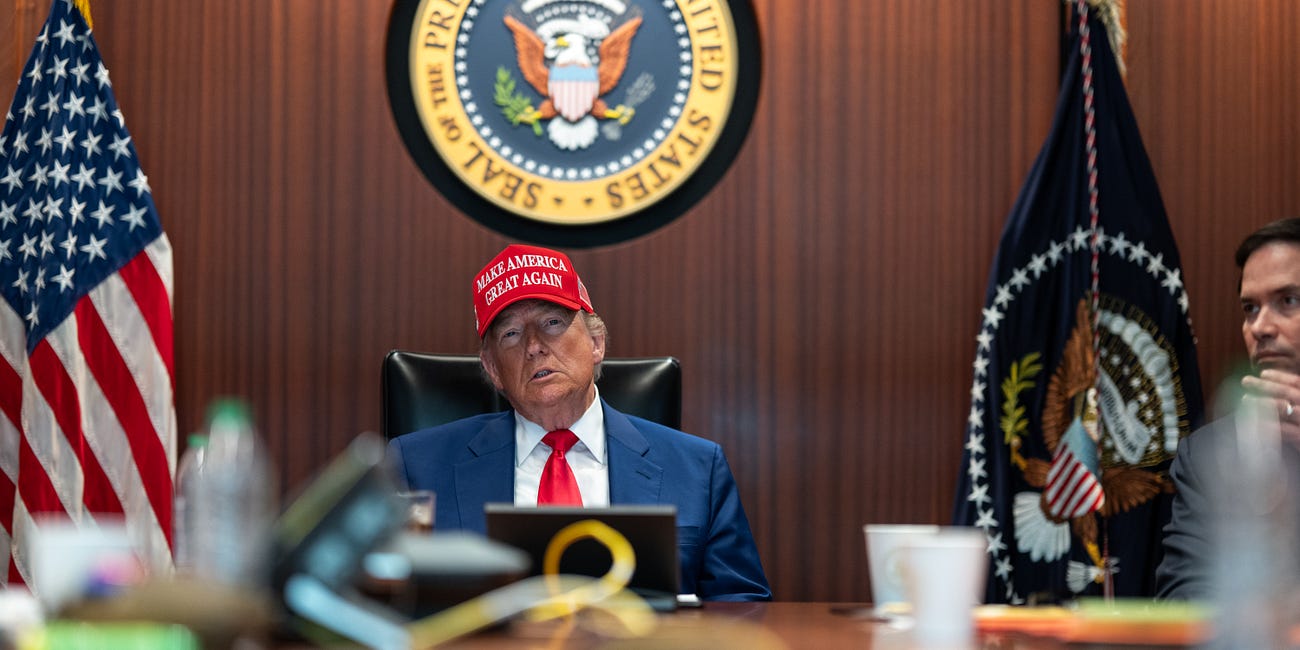By Not Condemning the U.S. Strike, the West are Trying to Redefine International Law
International law must prevail, but it probably won't.
Three Iranian nuclear facilities were bombed by the United States in the early hours of June 22nd. Fordow, Natanz, Isfahan. These are not theoretical targets. These are known sites of uranium enrichment, guarded, buried, and heavily monitored by international observers. And they were bombed by the world’s most powerful military before sunrise.
The most remarkable thing isn’t that it happened. It’s that it was met with silence. Or worse, approval. The United Kingdom issued a statement before the dust even settled, praising the attack as a "necessary step" to neutralize a grave threat. That wasn’t just support. That was cover. That was permission for others to follow suit. And now, silence from the rest of the West is doing the same thing. It is giving legitimacy to a strike that, by any standard of international law, should have triggered outrage.
For decades, nuclear infrastructure has been treated as sacrosanct. Not because it’s morally superior, but because it’s uniquely dangerous. Nuclear sites are not ordinary military targets, they are civilizational fault lines. They represent the thin veneer of restraint that has, despite endless conflict, prevented outright catastrophe. Bombing them is not just a military escalation, it’s a moral gamble.
Trump’s Iran Strike Violated the Constitution. Full Stop.
It doesn’t matter how many talking heads on cable news spin this. It doesn’t matter how many senators release mealy-mouthed statements about "concern." What happened was simple: the sitting president of the United States bombed a foreign nation without congressional approval,
When Russia shelled Zaporizhzhia, the condemnations were immediate and overwhelming. Western leaders spoke in one voice about unacceptable risk, civilian endangerment, and the need to protect the boundaries of war. The phrase "rules-based order" echoed through parliaments and press briefings. The implication was clear: civil nuclear sites were beyond the pale, and any violation would be met with unified, principled resistance.
Now, those same voices are nowhere to be found. No emergency sessions. No diplomatic ultimatums. No sanctions. No outrage. Just a deafening, collective shrug.
There was no threat of an imminent Iranian nuclear launch. There was no ticking clock. There were no inspectors screaming for airstrikes. The U.S. did this unilaterally, with no UN mandate, no international consensus, and no provocation. And the West, for the most part, just nodded.
This cannot be chalked up to a failure of imagination. The risks are not theoretical. Bombing nuclear facilities carries the potential for radiation release, long-term environmental devastation, and massive civilian harm. Even if that didn’t happen this time, it sets a precedent for when it does.
By remaining silent, Western governments are creating a new legal and diplomatic precedent: that nuclear sites can be bombed preemptively if you declare it necessary. That international law bends not to principle, but to power. That some countries must follow the rules, and others may write them.
This isn’t just hypocrisy, it’s legal sabotage. International norms only function when they’re enforced universally. If the law only applies to your enemies, it isn’t law. It’s leverage. And that leverage is now in the hands of every major power paying attention.
China is watching. Russia is watching. So is Israel, India, North Korea. The entire logic of arms control, of civilian protection, of nuclear restraint, just took a direct hit. If the U.S. can bomb nuclear facilities and call it defense, what stops Russia from doing the same in Poland? What stops Israel from flattening every suspected site in Syria or Lebanon? What stops North Korea from launching a preemptive strike in the name of its own perceived survival?
The legal language won’t matter anymore. The precedent has been set. Might makes right.
You cannot claim to defend a rules-based international order while applauding those who break it. You cannot say the world must respect nuclear oversight while remaining silent when your allies tear it down. And you cannot use international law as a sword against your rivals while treating it as a suggestion among friends.
What we are witnessing is not the collapse of diplomacy, it’s the voluntary abandonment of principle. The institutions that were built to restrain war are now accessories to it. The states that once championed accountability have gone mute. And in their silence, they are telling the world: there are no more rules, only interests.
The U.S. bombed Iranian nuclear sites. And unless something changes, unless condemnation is made clear, consequences are demanded, and the law is reaffirmed, this will not be remembered as an exception.
It will be remembered as the moment the exception became the rule. And from that moment forward, every act of aggression, every strike on critical infrastructure, every violation of sovereignty will carry one simple defense: "They did it first."
And they got away with it.






